Jeep Avenger VS Maxus Deliver 9 – Specs, Efficiency & Price Comparison
Which model is the better choice – the Jeep Avenger or the Maxus Deliver 9? We compare performance (156 HP vs 204 HP), boot capacity (380 L vs ), efficiency (15.40 kWh5.40 L vs 26.20 kWh8.80 L), and of course, the price (21400 £ vs 37200 £).
Find out now which car fits your needs better!
The Jeep Avenger (SUV) is powered by a Electric, Petrol MHEV or Petrol engine and comes with a Automatic or Manuel transmission. In comparison, the Maxus Deliver 9 (Cargo Van) features a Diesel or Electric engine and a Manuel or Automatic gearbox.
When it comes to boot capacity, the Jeep Avenger offers 380 L, while the Maxus Deliver 9 provides – depending on what matters most to you. If you’re looking for more power, you’ll need to decide whether the 156 HP of the Jeep Avenger or the 204 HP of the Maxus Deliver 9 suits your needs better.
There are also differences in efficiency: 15.40 kWh5.40 L vs 26.20 kWh8.80 L. In terms of price, the Jeep Avenger starts at 21400 £, while the Maxus Deliver 9 is available from 37200 £.
Compare all the key specs now and find out which model fits your lifestyle best!
Jeep Avenger
The Jeep Avenger is a compact SUV that brings a blend of rugged design and modern technology, making it ideal for both urban and off-road adventures. Its robust build and distinctive styling capture Jeep's iconic spirit while offering a comfortable and refined driving experience. With advanced safety features and a versatile interior, the Avenger caters to a wide range of drivers looking for practicality and excitement.
details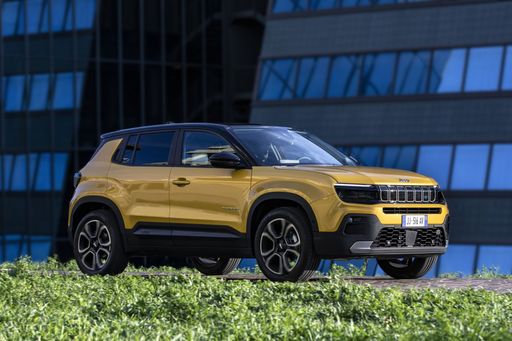 @ Stellantis
@ Stellantis
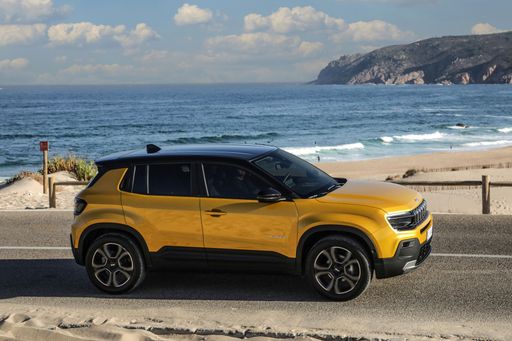 @ Stellantis
@ Stellantis
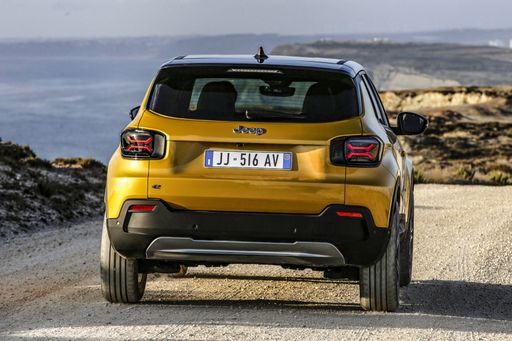 @ Stellantis
@ Stellantis
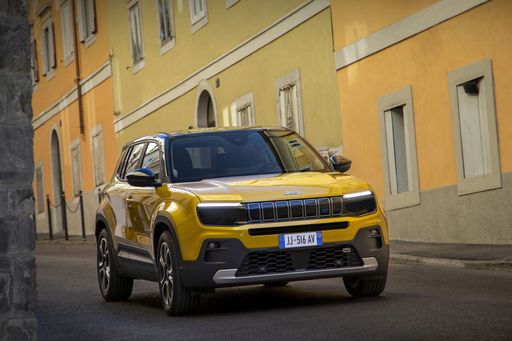 @ Stellantis
@ Stellantis
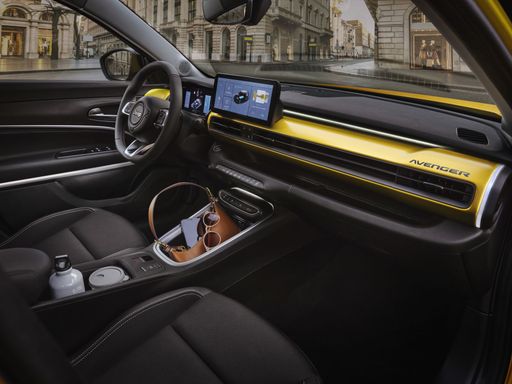 @ Stellantis
@ Stellantis
Maxus Deliver 9
The Maxus Deliver 9 presents itself as a robust and versatile vehicle, perfectly suited for both urban and rural deliveries. With a spacious cargo area and a modern cabin equipped with advanced technology, it caters to the needs of both driver comfort and logistical efficiency. Its sleek design and reliable performance make it an attractive option for businesses looking to upgrade their fleet.
details

|
|
|
|
|
Costs and Consumption |
|
|---|---|
|
Price
21400 - 37300 £
|
Price
37200 - 80100 £
|
|
Consumption L/100km
5.4 - 5.7 L
|
Consumption L/100km
8.80 L
|
|
Consumption kWh/100km
15.40 kWh
|
Consumption kWh/100km
26.2 - 38.4 kWh
|
|
Electric Range
400 km
|
Electric Range
265 - 358 km
|
|
Battery Capacity
51 kWh
|
Battery Capacity
-
|
|
co2
0 - 130 g/km
|
co2
0 - 254 g/km
|
|
Fuel tank capacity
44 L
|
Fuel tank capacity
-
|
Dimensions and Body |
|
|---|---|
|
Body Type
SUV
|
Body Type
Cargo Van
|
|
Seats
5
|
Seats
3 - 7
|
|
Doors
5
|
Doors
4
|
|
Curb weight
1180 - 1520 kg
|
Curb weight
2360 - 2870 kg
|
|
Trunk capacity
325 - 380 L
|
Trunk capacity
-
|
|
Length
4084 mm
|
Length
5546 - 5940 mm
|
|
Width
1776 mm
|
Width
2062 mm
|
|
Height
1528 - 1536 mm
|
Height
2525 - 2765 mm
|
|
Payload
394 - 502 kg
|
Payload
630 - 1275 kg
|
Engine and Performance |
|
|---|---|
|
Engine Type
Electric, Petrol MHEV, Petrol
|
Engine Type
Diesel, Electric
|
|
Transmission
Automatic, Manuel
|
Transmission
Manuel, Automatic
|
|
Transmission Detail
Reduction Gearbox, Dual-Clutch Automatic, Manual Gearbox
|
Transmission Detail
Manual Gearbox, Reduction Gearbox
|
|
Drive Type
Front-Wheel Drive, All-Wheel Drive
|
Drive Type
Front-Wheel Drive, Rear-Wheel Drive
|
|
Power HP
100 - 156 HP
|
Power HP
148 - 204 HP
|
|
Acceleration 0-100km/h
9 - 10.9 s
|
Acceleration 0-100km/h
16 - 25 s
|
|
Max Speed
150 - 194 km/h
|
Max Speed
90 - 160 km/h
|
|
Torque
205 - 260 Nm
|
Torque
310 - 375 Nm
|
|
Number of Cylinders
3
|
Number of Cylinders
4
|
|
Power kW
74 - 115 kW
|
Power kW
108 - 150 kW
|
|
Engine capacity
1199 cm3
|
Engine capacity
1996 cm3
|
General |
|
|---|---|
|
Model Year
2023 - 2024
|
Model Year
2020 - 2024
|
|
CO2 Efficiency Class
A, C, D
|
CO2 Efficiency Class
G, A
|
|
Brand
Jeep
|
Brand
Maxus
|
Jeep Avenger
Unveiling the Jeep Avenger: A New Era of Innovation
The Jeep Avenger marks a significant milestone in automotive evolution, blending ruggedness with modern-day advancements. Established within the SUV category, the Avenger offers an eclectic mix of powertrains, including electric and hybrid options, catering to the diverse requirements of the modern motorist.
Powertrain Options: Efficiency Meets Performance
The Jeep Avenger presents multiple powertrain configurations, each designed to harmonise performance with efficiency. The electric version boasts a formidable 156 PS and a battery capacity of 51 kWh, enabling a remarkable 400 km of electric range. This places it at the forefront of environmentally friendly travel with a consumption of merely 15.4 kWh/100km.
Additionally, for those favouring classic combustion engines, the 1.2 e-Hybrid and the purely petrol 1.2 GSE T3 offer 100 PS and incorporate innovative mild-hybrid technology to enhance fuel efficiency while maintaining a spirited driving experience.
Advanced Engineering: Technology and Design
At the heart of the Jeep Avenger lies a well-engineered chassis, tailored for both agility and comfort. Measuring 4084 mm in length, 1776 mm in width, and up to 1534 mm in height, the Avenger ensures ample space within a compact footprint, ideal for urban manoeuvrability.
The vehicle supports its robust engineering with meticulous design details, from its substantial boot capacity of up to 380 litres to its five-door configuration, seamlessly blending functionality with aesthetic appeal.
Driving Dynamics and Performance
Front-wheel drive ensures that the Avenger's power is perfectly harnessed for both city streets and off-road trails. The vehicle's acceleration capabilities vary between 9 and 10.9 seconds from 0-100 km/h, a testament to its spirited performance ethos. With a maximum speed ranging up to 184 km/h, the Avenger is built to deliver thrilling drives.
Sustainability at the Forefront
As a reflection of Jeep's commitment to sustainability, the Avenger achieves commendable CO2 efficiency ratings spanning classes A to D. The electric model stands out with zero emissions, while hybrid options offer competitive CO2 figures, appealing to eco-conscious drivers.
Pricing and Trim Levels
The Jeep Avenger is strategically priced between 25,000 and 43,500 €, ensuring accessibility for a broad range of customers. With available trim levels such as Longitude, Altitude, and Summit, prospective buyers can tailor their vehicles to suit individual preferences, choosing from different feature sets and functionalities.
Conclusion: The Jeep Avenger's Promise
The Jeep Avenger is not just a new vehicle; it embodies a shift towards innovative, efficient, and dynamic motoring. By merging advanced technology with Jeep's legendary prowess, the Avenger is poised to redefine expectations within the SUV sector, offering both cutting-edge performance and unyielding reliability.
Maxus Deliver 9
A Versatile Workhorse: The Maxus Deliver 9
The Maxus Deliver 9 is rapidly gaining traction in the commercial vehicle sector. As a versatile and capable van, it meets the needs of a range of industries, providing both diesel and electric powertrains. The model year updates from 2020 to 2023 bring a host of technical advancements and innovative features that make the Maxus Deliver 9 stand out in its class.
Powertrain Options: Diesel and Electric
The Maxus Deliver 9 offers a choice between traditional diesel and modern electric powertrains. The diesel variant comes with a 2.0-litre engine, delivering 148 PS and a torque of 310 Nm. It is available with both front and rear-wheel drive configurations, coupled with a manual gearbox. These options provide robust and reliable performance for traditionalists who favour a dependable diesel setup.
For those looking to the future, the electric eDeliver 9 offers compelling specifications. With a power output of 204 PS and torque reaching 375 Nm, the electric version provides a silent and efficient drive. Battery capacity options cater to different needs, with ranges spanning from 265 km to an impressive 328 km depending on the chosen battery configuration. This makes the eDeliver 9 a viable choice for urban and regional deliveries.
Innovative Features for Enhanced Utility
The Maxus Deliver 9 is equipped with features designed to enhance practicality and comfort. With a payload capacity ranging from 630 to 1275 kg, it is well-suited for various commercial applications. The model’s dimensions and configurable seating options (accommodating between 3 to 7 passengers) add flexibility, making it ideal for both logistics and passenger transport roles.
Despite its work-focused design, the Deliver 9 doesn’t skimp on creature comforts. The cabin offers a modern infotainment system with touchscreen capabilities, providing intuitive control over navigation and connectivity functions. Advanced safety features, including lane departure warning and adaptive cruise control, are available, ensuring peace of mind for drivers and fleet managers alike.
Environmental and Economic Efficiency
In an era where sustainability is paramount, the Maxus Deliver 9 delivers low operating costs and reduced environmental impact, particularly in its electric form. The electric models boast zero tailpipe emissions and CO2 efficiency class ratings up to A, making them an attractive choice for green-conscious businesses.
From an economic standpoint, the electric variants also offer long-term savings through reduced fuel costs and maintenance requirements compared to their diesel counterparts. Initial pricing for the Deliver 9 ranges from €43,423 to €93,403, depending on the specification and powertrain, representing competitive value within the segment.
Conclusion: Meeting Modern Transport Needs
The Maxus Deliver 9 represents a compelling proposition in the commercial vehicle market. With its blend of diesel and electric powertrains, innovative features, and a focus on efficiency, it meets the diverse needs of modern businesses. Whether prioritising traditional power or embracing new technologies, the Deliver 9 offers a versatile choice that businesses can rely on for both present and future transportation needs.
The prices and data displayed are estimates based on German list prices and may vary by country. This information is not legally binding.
